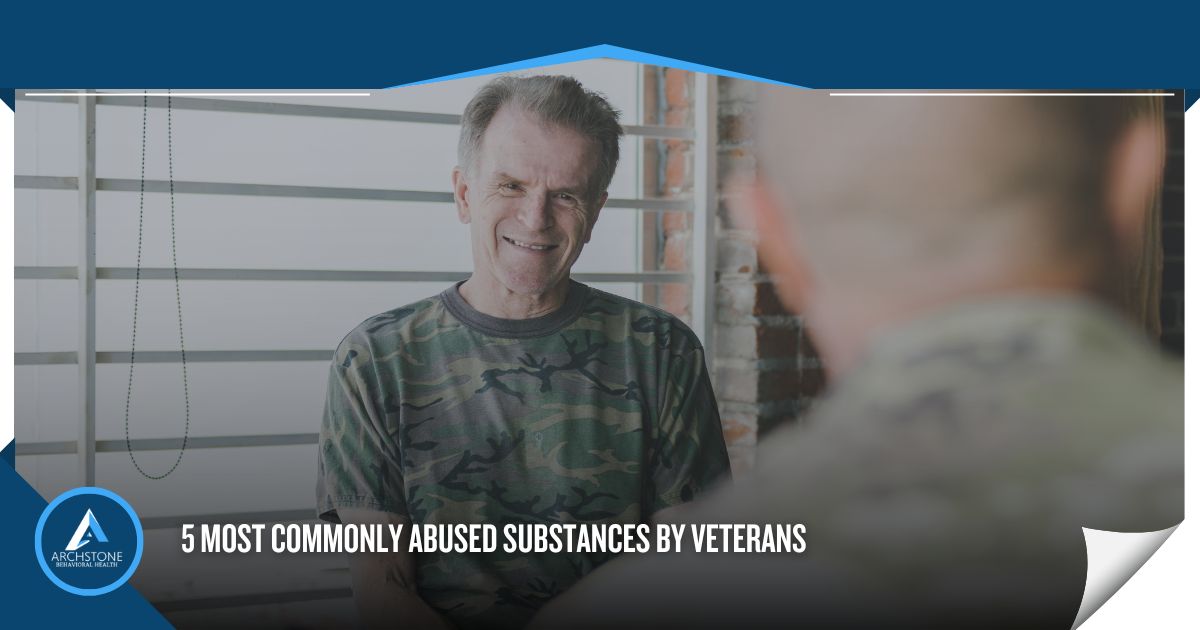5 Most Commonly Abused Substances by Veterans
Get Help Now
Being a member of the military comes with many benefits, however, you are more likely to be exposed to stressful situations and traumatic events. Because of this, veterans often deal with a higher level of substance misuse than the general population. They tend to abuse drugs or alcohol to deal with the lasting psychological effects of active duty.
According to the National Library of Medicine, 11% of the veterans who sought care from the VA met the criteria for a substance use disorder.[1]
Knowing the substances commonly used by veterans can lead to a broader conversation about substance abuse, addiction, and recovery. Veteran substance abuse can be complex, but recovery is possible with professional treatment.
The top 5 most commonly abused substances among veterans include alcohol, marijuana, prescription drugs, cocaine, and meth.
1. Alcohol
American society heavily embraces alcohol. As a result, many people struggle with alcohol use disorders. However, veterans are at an even higher risk of abusing alcohol.
The main reason veterans choose alcohol over other substances is because it will not show up on drug screening tests, which are required during active duty.
According to the Substance Abuse and Mental Health Services Administration (SAMHSA), 4 in 5 veterans struggle with alcohol abuse.[2]
When someone abuses alcohol long-term, they are at risk of developing liver damage, heart complications, increased danger of accidents or injuries, and even overdoses. As a result, any veteran experiencing alcoholism should seek help from an alcohol rehab program.
2. Marijuana
The second most commonly abused substance by veterans is marijuana. While cannabis is legal in some states for medicinal and recreational use, it can lead to addiction just like any other mind-altering substance.
SAMHSA reports that 12.8% of veterans abuse marijuana, which is equivalent to 2.6 million people.[2]
While marijuana does not lead to life-threatening overdoses, long-term use can cause devastating mental health effects. For example, many people have reported experiencing cannabis-induced psychosis because of the high levels of THC that today’s marijuana contains.
When you couple these psychological risks with pre-existing mental health issues from deployment, marijuana abuse can be devastating.
3. Prescription Drugs
Many veterans struggle with mental health conditions that require treatment using medication. For example, 7% of veterans struggle with post-traumatic stress disorder (PTSD).[3] Veterans with PTSD might abuse the medications that they are prescribed.
Other veterans might deal with mental health disorders like anxiety conditions that are often treated with medications that can lead to addiction, like benzodiazepines. Additionally, some veterans might deal with lasting chronic pain from injuries during deployment, which might be treated with prescription opioid drugs.
Since so many veterans are on prescription medications, there is a high rate of prescription drug abuse. According to SAMHSA, 801,000 veterans abuse psychotherapeutic drugs.[2]
4. Cocaine
The next most commonly abused drug among veterans is an illicit drug known as cocaine. SAMHSA reports that 233,000 veterans abuse cocaine.[2]
While this substance is not abused as frequently as alcohol or marijuana, many veterans use it to cope with everyday life. The energizing and confidence-boosting effects of cocaine might make it easier for veterans to get the energy they need to socialize and work full-time jobs.
Unfortunately, cocaine abuse will only worsen the mental health issues veterans are facing and lead to long-term health consequences. As a result, anyone suffering from cocaine addiction should seek help from a drug rehab center that specializes in treating veterans.
5. Methamphetamine
The 5th most commonly abused substance among veterans is meth. SAMHSA reports that 109,000 veterans abuse meth.[2]
Since meth drug is cheap, long-lasting, and provides heightened energy, veterans might use it to cope with everyday life after deployment. Additionally, many people report that meth causes emotional numbing, which might cause veterans with mental health issues to be attracted to it.
Even though meth might cause short-term emotional blunting and increases in energy, the long-term effects of it are devastating. For example, it is possible to develop heart conditions, dental decay, skin sores, psychotic behavior, and life-threatening overdoses.
Because of the dangers of meth abuse, professional addiction treatment is necessary. Drug rehab programs for veterans can help you overcome your meth addiction while addressing the root causes of your substance abuse that are often related to your time in the military.
Get Connected to a Drug and Alcohol Rehab Center for Veterans
If you or a loved one are a veteran struggling with addiction, recovery is possible. While addiction treatment for veterans often requires specialized services, rehab programs like Archstone Behavioral Health are equipped to help you.
Our addiction treatment center has a focus on recovering from trauma, co-occurring mental health issues, and other root causes of addiction that veterans often struggle with.
To learn more about our drug and alcohol rehab program specifically designed for veterans, contact Archstone Behavioral Health today. We have tons of substance use treatment options available.
References:
- The National Library of Medicine (NLM): Substance use disorders in military veterans: prevalence and treatment challenges, Retrieved January 2024 From https://www.ncbi.nlm.nih.gov/pmc/articles/PMC5587184/
- The Substance Abuse and Mental Health Services Administration (SAMHSA): 2019 National Survey on Drug Use and Health: Veteran Adults, Retrieved January 2024 From https://www.samhsa.gov/data/sites/default/files/reports/rpt31103/2019NSDUH-Veteran/Veterans%202019%20NSDUH.pdf
- The U.S. Department of Veterans Affairs (VA): How Common is PTSD Among Veterans, Retrieved January 2024 From https://www.ptsd.va.gov/understand/common/common_veterans.asp
